Biomedical Imaging REU Helps Undergrads Make Educated Decisions About Grad School
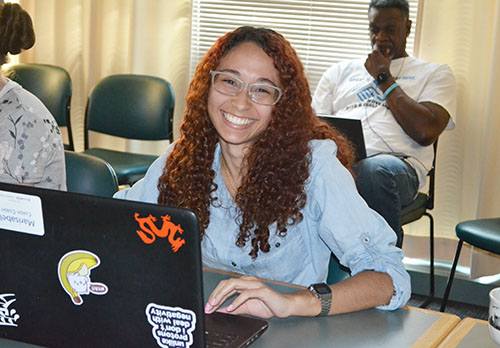
2019 Biomedical Imaging REU participant, Marisabel Colón Colón works on her presentation during a weekly Biomedical Imaging REU meeting.
August 29, 2019
In its fifth year, the NSF-funded Biomedical Imaging REU brought ten undergraduate students from across the country, even Puerto Rico, to Illinois to expose them to the idea that studying biomedical engineering in graduate school might be a viable direction for their future. Through the REU, they discovered how rewarding research can be, gained poster-making and oral presentation skills, built relationships with peers on a similar career track, and even networked for the future.
According to PI Marina Marjanovic, a Bioengineering Teaching Associate Professor, the goal of the REU was simple. “To introduce undergraduate students to the research that they will face in graduate school,” she explains. The idea was to help them make an educated decision. Do they want to do research? What kind of research? What is graduate school all about? What does it require—not just in terms of courses, but the research?
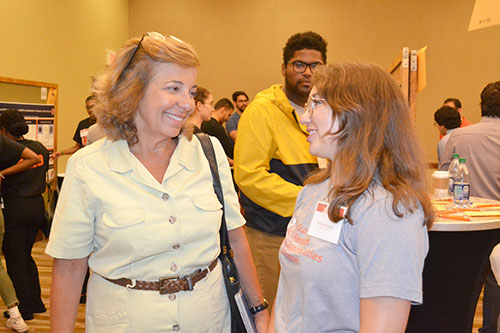
PI Marina Marjanovic chats with Hannah Bagley at the Illinois Summer Research Symposium.
Another goal of the REU, of course, was to foster interest in biomedical imaging and engineering. So the ten conducted cutting-edge research this summer on a variety of different topics under prominent researchers. Besides becoming invested in their own research, the students were exposed to the broader biomedical imaging field via their peers’ research, as well what they gleaned through various meetings and seminars.
In addition to exposing undergrads to research, the REU also provided professional development to help them hone other skills useful in grad school. “We help them to understand what it is to present the poster; what it is to present, orally, their research," Marjanovic explains. "And also we teach them how to write the good resume, how to write the good proposal, how to write the fellowship proposal, how to apply for graduate school.”
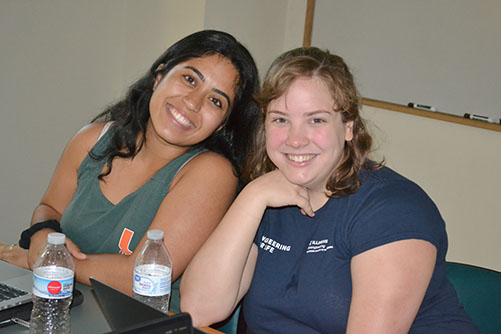
2019 Biomedical Imaging undergrads Disha Patel and Elizabeth Breen during a weekly meeeting where the undergrads were doing trial runs of their oral presentations.
Along with learning how create a poster and present research, the undergrads also got to use their newly acquired skills. On July 18th, they presented their research during a poster session at the 2019 Illinois Summer Research Symposium (ISRS) at the I-Hotel, explaining their project in detail to mentors, PIs, REU staff, fellow REU participants, and interested visitors.
“But we're not done with this group,” Marjanovic divulges, concerning her post-ISRS plans for the group. “Because in the next couple of weeks when they are done with this meeting, we sit down and we write the abstract for the real conference.” What Marjanovic terms “the real conference” is actually BMES, the Biomedical Engineering Symposium, held every year in October, with a special section for undergraduate research on Saturday mornings.
So this October, Marjanovic will take nine of the undergrads with her to BMES. “So they're going to present real research at a real conference,” she says. “So this is, for many of them, their first exposure to a real conference.” They also get to hear presentations from eminent scientists, meet other researchers, plus be introduced to different universities and grad programs. “And then they present their own research,” she says. “So I think, all together, it's a very well-rounded, very comprehensive program.”
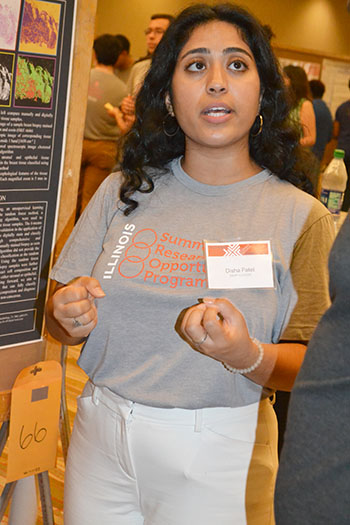
Disha Patel presents her research during the Illinois Summer Research Symposium.
Another goal of the REU was to provide opportunities for the students to “network with the other people in their own field and other fields,” Marjanovic says.
“They meet a lot of people,” she adds, “and I always tell them, ‘You know, five years from now, or 10 years from now, you're going to meet the same people in some conferences. It's like, ‘Oh, we met, you remember?’”
In a similar vein, another strength of the REU is that the students have tended to form community and build long-term relationships. “They stay in touch,” Marjanovic acknowledges. Referring to students from the first REU, she reports: “What's amazing for me is that after five years, so many of these students stayed in touch with each other.” Using Facebook, other social media, as well as email, past participants not only stay in touch with each other, but with the REU staff. “But it's important for them to stay in touch,” she continues, believing that their doing so may have served to encourage one another to attend grad school.
And regarding Marjanovic’s goal of guiding the undergrads to grad school, it appears to be working. “We are very proud that about 90% of all the students that went through this program entered grad school,” she admits. And a good number of past participants have ended up at Illinois too. Out of the 40 students who have finished the program so far, eight, or 20%, are at Illinois. “So I'm very pleased that so many students decided to come here,” she remarks. And while she’s delighted when students attend grad school here, her main goal is to pique their interest in biomedical imaging.
“We give them opportunity to see what's available on this campus,” she maintains, but also tells them that the resources that exist, or what grad school life is like, not only professionally but socially, is not limited only to this campus, but that there are a lot of similarities between the different campuses in general. And some have chosen to go elsewhere.
“But, even if they asked me to write a letter reference for some other university, that's okay,” Marjanovic adds, sharing several legitimate reasons why some might not end up at Illinois, such as getting a better offer, wanting to stay close to the family, their boyfriend going to the other school, going to medical school, or just finding a job. “But still, this is a precious experience,” she acknowledges, "regardless of what they do.”
So while Marjanovic would love for the REU participants to come to Illinois, she says any grad school will do: “But for me, the goal is to introduce the research and introduce graduate school and just encourage them,” says Marjanovic. “Because some of them don't know what this is all about, and some even don't think that they are good enough. But this really encourages them that, ‘Yes, they can do it!’”
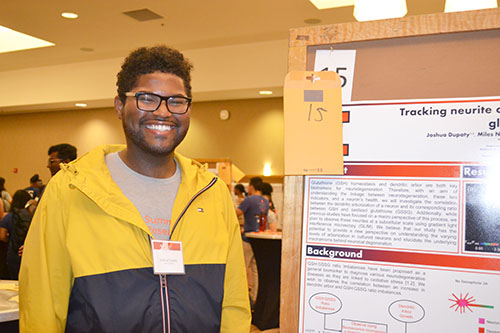
Joshua Dupaty at the Illinois Summer Research Institute.
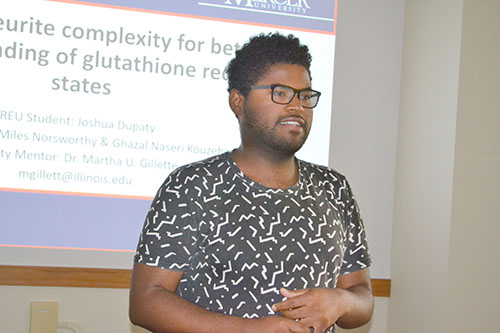 Joshua Dupaty practices giving his oral presentation during a REU weekly meeting.
Joshua Dupaty practices giving his oral presentation during a REU weekly meeting.One participant who didn’t believe he was good enough was Joshua Dupaty, a rising senior studying biomedical engineering at Mercer University in Macon, Georgia. He shares how he’s grown personally through the experience.
“I've really learned how to actually sell myself during this REU,” he claims. He confesses that he’s been plagued by imposter syndrome—he often believes that he doesn’t deserve to be in certain situations, or that he hasn’t done the work when he really has. “So this REU has really made me realize I've put in my work, and I've learned a lot, and I've really put myself out there, and it's helped me just to expand professionally. So the professional development seminars that SROP has held have really helped in terms of learning how to sell myself and not be subjected to imposter syndrome, and understand that I'm here for a reason.”
Dupaty shares another impact he feels the summer has had—he’s pretty much settled his career plans for the future. “I came into this summer knowing that I really wanted it to boost my research experience. So a big goal of mine for a while now has been to go and get my doctorate. The PhD is the end goal for me in terms of education. So I knew that I wanted something that really expanded my horizons and expanded, I guess, my depth of knowledge in all the areas of biomedical engineering.”
Dupaty ended up in this REU because he was specifically looking for an imaging REU. The REU that he participated in last summer was more focused towards simulations and medical device design. “So I just really wanted to broaden my horizons and really look at all the different fields that happen in biomedical engineering,” he admits. So when a friend who had done and really enjoyed this REU last summer suggested that he apply, he did. “So I wanted to try it out for myself too, and I was accepted, so I was like, ‘Heck yeah, I'll go!’ It's been a really good experience. I've learned a lot.”
For Dupaty, the most challenging thing this summer was the “steep learning curve.” Much of what he’s learned from classes and other research has been focused on both prosthetics and what he calls macro imaging—radiology, MRIs, that sort of thing. He says the imaging he did in this REU was more microscopy—very small-scale imaging.
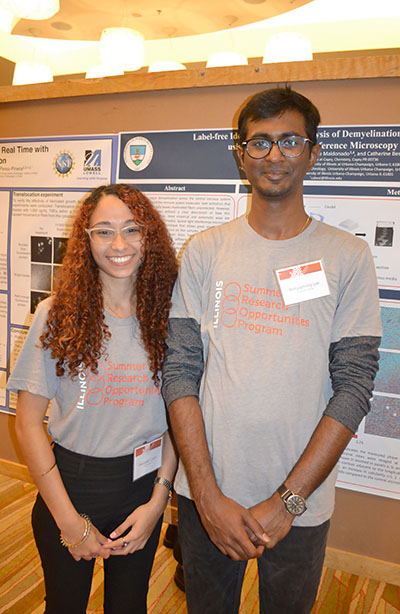
2019 Biomedical Imaging undergrad Marisabel Colón Colón and the REU's Research Team Leader, Rishee Iyer, during the Illinois Summer Research Symposium.
“I'm in a neuroscience lab right now, so it's very out of my depth in terms of knowledge,” he admits. “So I had to really pick up and acquire a lot of knowledge. But my PI and all my grad mentors were very helpful. I really have to thank them because they are very responsive to my questions…and I had a lot. So I learned a ton.”
Like Marjanovic, Rishee Iyer, the REU’s Research Team Leader, says his overall goal for the REU students is for them to go to graduate school in the field of biomedical imaging. “Because this is an all-encompassing field that requires a multidisciplinary and unique approach to things. And that's what I want the students to get into, that kind of mindset where you don't technically focus on one particular topic, oblivious to everything as you try to bring many aspects of research together.”
According to Iyer, the greatest impact he believes the REU had on the participants was helping them make decisions about their future. “I think, most importantly, they know whether they want to go to grad school or not and if they do want to go to grad school, what kind of research that they want to do.”
One REU participant who pretty much figured out what she wants to do in the future was Marisabel Colón Colón, a rising junior majoring in Chemistry at the University of Puerto Rico. Colón believes the summer had a significant impact on her career choices.
“So at first, I didn't know if I really want to do a PhD or not, because I've never experienced doing research in this field. But after these two whole months, I learned that I really like it and will be interested in doing a PhD.”
Colón heard about the REU at a conference she attended. Interested in going for a PhD in neuroscience, she did her research, got really got excited when she discovered that the REU combined bioengineering with neuroscience and brain tissues, and applied.
Colón worked in Catherine Best’s lab, mentored by fellow Puerto Rican Jorge Maldonado, Best’s PhD student. Her research involved using SLIM (Spatial Light Interference Microscopy) to study changes multiple sclerosis makes on the brain’s corpus callosum (the stem that connects the left and right sides of the brain).
“I really like this area,” she adds, hinting that she might want to continue studying the subject in grad school. Plus, she wants to come to Illinois, because she really liked the folks she was working with. “Yeah, of course. This is one of my schools that I'm considering,” she says.
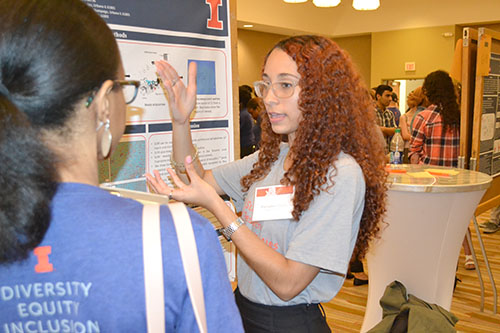
Marisabel Colón Colón presenting her research at the Illinois Summer Research Symposium.
For Colón, another benefit of the REU was the networking. Besides her PI and mentor, she took advantage of the opportunity to do additional networking. “In the last day that I have, I would like to communicate more with other PIs and everything to learn about different paths here.”
Colón shares some challenging things about the summer. “The most challenging, first, was my English,” she admits. Another challenge she encountered was reading papers: “Because it was my first time that I did a real investigation with PIs and everything. So I think reading papers was the hardest part for me.”
Another difficult-but-beneficial thing about this summer was discovering what it’s like to be a PhD student. “I do investigation in my home school,” she acknowledges, “but it's not the same as being here alone and doing only investigation and everything. That was the hard part—getting used to doing that PhD life.” But despite the challenges, Colon recommends applying to this REU, calling it “very beneficial for everyone.”
Another student who got some clarity regarding the field she’d like to go into was Elizabeth Breen, a rising sophomore at Fordham University Lincoln Center, majoring in integrative neuroscience. She shares why she got involved with the Frontiers in Biomedical Imaging REU.
Breen actually knew about her faculty mentor, Dr. Dobrucki, and his work before she came here. In fact, she reached out to him directly, asking if she could work in his lab. “He actually recommended that I apply to this program, which I did, and I'm very happy to be here. I'm very happy that he was so excited to have me in his lab, ‘cause I'm equally as excited about the work that his lab does and that I'm now doing.”
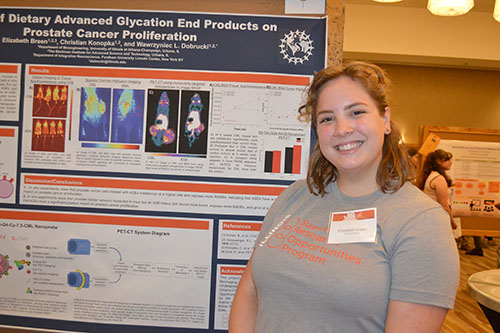
Fordham University undergrad Elizabeth Breen by her poster about how certain elements in the Western diet proliferate cancer.
Breen shares the results of her research. “So our research means that you should be careful about the things that you're eating…We're investigating the results of certain elements that are included in the Western diet, and how they proliferate cancer.” By Western diet, she means that foods high in fat and/or sugar, over-processed food, and foods cooked at high temperatures “are generally, from what we're seeing, not the best for you.” While the Western diet is not necessarily a cause for prostate cancer, she says it “proliferates and causes increased growth and increased progression.”
Breen is definitely interested in continuing to study cancer. “I have been for a while now,” she acknowledges, “and it was great to be able to come to U of I because we have so many resources, so many imaging modalities, and my lab does particularly a lot of work in pet CT. Those are resources that I don't really have at my home university. So being able to come here and do that has been a great opportunity.”
The most challenging thing about this summer, according to Breen, was balancing working in a lab and doing all of the outside work that’s part of the program. And while she’s gotten a lot of great help as far as how to write a paper and do a poster presentation, she says, “But sort of balancing that with the full-time job of doing research has been a challenge…but something that I think I finally found a good balance for.”
Regarding whether this summer has had an impact on what she’s going to end up doing career-wise, Breen admits: “I definitely have gotten to see what a PhD student does up close. And I was lucky because I've been very curious about doing an MD/PhD, and my graduate mentor is an MD/PhD student.”

2019 Biomedical Imaging undergrads Disha Patel and Elizabeth Breen during a weekly meeeting where the undergrads were practicing their oral presentations prior to the ISRS.
Of course, another opportunity she’s now aware of is the Carle-Illinois College of Medicine. “Yeah, so seeing up close what's available to me, especially as a younger student, has been an unexpected and highly appreciated element of this program.
Another of Breen’s takeaways was the mentoring relationships. “I think that the relationship with anyone who's mentoring you is the most valuable part of a program like this, because they're both going to give you insight and help you along the way. They're looking out for you, I think, is the big part of it. And so getting a relationship like that out of this program and somebody who's gonna hopefully be there to help me and down the road has been really valuable to me.”
Breen expresses her gratitude to all those involved with the program—her faculty mentor as well as all the people who supported her along the way, especially the Frontiers in Bioimaging REU and the National Science Foundation.
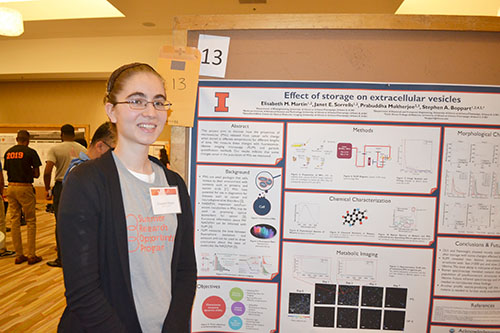
Elisabeth Martin, a rising Bioengineering sophomore at Illinois who participated in the 2019 Biomedical Imaging REU.
Another young student who benefitted from the REU was rising sophomore, Elizabeth Martin, who’s majoring in Bioengineering at Illinois. She shares that she participated in the REU because she saw it as a really great opportunity for a freshman. “I'm just coming off of my freshmen year. It was a really good opportunity for me to learn more about research, to have a lot of professional development, just to learn a lot about how to make something really good. Like how to make a proposal, how to make a poster, how to edit it several times and get a final draft. That's really good.”
Martin’s research was about how storage can affect the characteristics of extracellular vesicles, which hopefully in the future, may be used to diagnose and/or treat cancer or degenerative diseases. Regarding the results of her study, she reports that she and her team were able to get actually quite a bit of data, and found that they needed to attack the project in a slightly different direction, starting with a different cell line. “So it was good to learn that, and we'll continue that.”
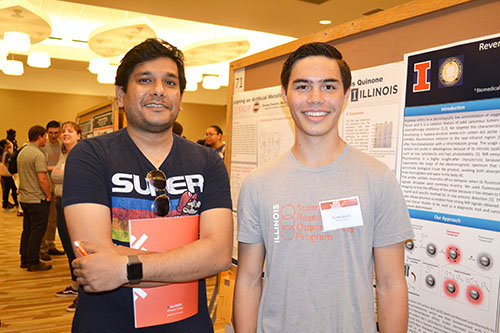
Curtis Brent (right) with his mentor, Indrajit Srivastava, at the Illinois Summer Research Institute.
The most challenging thing about this summer for Martin was “having a project, and trying to completely understand it, to just dive into it and try to get results by six or eight weeks. And just diving into a new topic and learning about it is challenging, but it's good.”
Despite the long hours the undergrads have spent in the lab this summer, Marjanovic admits her protégés most likely won’t make a groundbreaking discovery in the two months they’re here. “Not possible,” she says, although she doesn’t rule out the possibility: “If you do, great…” She shares what they did accomplish: they learned some methods, some techniques, and were immersed in a lab where other people are doing a lot of research—quite different from their regular school year. “So whatever you get as a result, it's fine. You're not going to be graded. You know there is no grade. Yes, you have to present, but there is no grade; there is no test; there is no quiz, and there's no exam. So it's fine.”
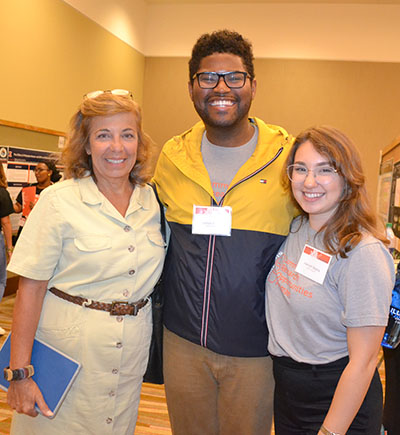
Biomedical Imaging REU PI Marina.Marjanovic, Joshua Dupaty, and Hannah Bagley at the Illinois Summer Research Symposium.
While Marjanovic admits that the REU is a lot of work, she enjoys it. “So I think it's just very rewarding, very rewarding. It's a lot of work, year round,” sharing that the moment she gets back from BMES in October, she’ll start the application process for the next REU cohort, receiving applications, selecting participants, then organizing their travel. “So it's like a 12-month thing.”
Her take on the entire summer 2019 experience? “I think we did really accomplish what we were looking for.”
Author/Photographer: Elizabeth Innes, Communications Specialist, I-STEM Education Initiative
More: 2019, Biology, Research Experiences for Undergraduates, REU: Bioimaging, Summer Research Programs
For additional articles about the Bioimaging REU, see:
- Program Provides Undergrads with Research Experience, Professional Development
- Bioimaging REU's Matt Kavanaugh Experiences Cancer Research at Illinois
- Wendy Reyes Learns Life Skills—and to Like Research—in Bioimaging REU
- Summer Research Experience Exposes Undergrads to Bioimaging at Illinois
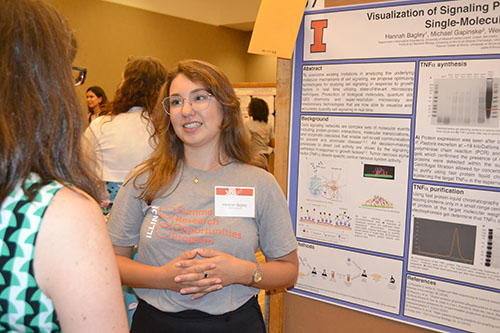
2019 Biomedical Imaging REU participant, Hannah Bagley, presenting her research.
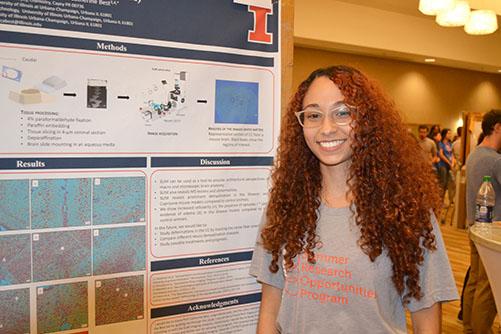
Marisabel Colón Colón during the Illinois Summer Research Symposium.
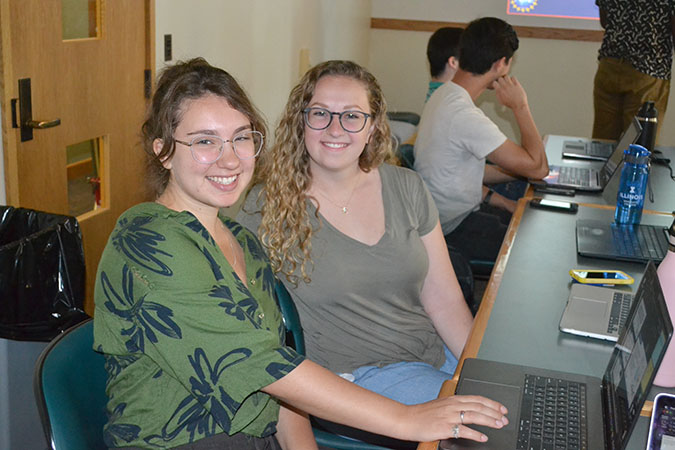
Biomedical Imaging REU participants Cheri McChesney and Mary Kramer wait their turn during a practice session where the undergrads gave their oral presentations to each other.













.jpg)
















